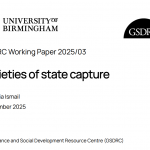Zenobia Ismail Abstract: The literature on state capture is growing and encompasses more countries and contexts. This paper argues that it is time to consider varieties of capture that have different trajectories and outcomes. Two factors, the level of democracy and the strength of institutions, are proposed as starting points for thinking about varieties of capture. Using ...» more
Transparency
Transparency and performance
This report presents and discusses the evidence on impact from greater donor transparency, particularly in terms of accountability. In this report we distinguish between two types of aid information: information collected and disseminated by donor agencies about the results of their activities (looking closer at results based management), and information open to the public ...» more
Transparency and accountability initiatives in the extractives sector
Research on the impact and effectiveness of transparency and accountability initiatives (TAIs) targeted at the extractives sector is hard to come by. With the exception of some more systematic evaluation of the impact of multi-stakeholder initiatives, in particular the Extractive Industries Transparency Initiative (EITI), the existing evidence is weak. Indeed, beyond the ...» more
Parliamentary transparency and accountability
This report presents and discusses what evidence exists about initiatives to promote transparency among legislators, members of parliament (MPs), and legislative processes and what impact this has had on legislative accountability. In this report we distinguish between two types of accountability: vertical (in which citizens play a direct role in holding the powerful to ...» more
Transparency and accountability in fragile and conflict-affected settings
Over the past 10 years, there have been numerous meta-studies and syntheses of the impact and effectiveness of transparency and accountability initiatives (TAIs), many of which attempt to incrementally add value to the existing evidence base or offer new perspectives on existing conclusions. These studies are almost unanimous in their conclusion that little of practical or ...» more
Decentralisation of budgeting process
This literature review examines evidence about the impact of public financial management (PFM) interventions in the field of decentralisation of budgeting. It asks: What is the effectiveness of devolved budgeting models in relation to the efficiency of PFM systems, service delivery, budget allocation, citizen involvement, accountability and anti-corruption? What factors ...» more
Public procurement reform: assessing interventions aimed at improving transparency
This Rapid Evidence Assessment (REA) asks: what is the effectiveness of different interventions that aim to improve the transparency of public procurement? It also asks: What is the impact of improved procurement on accountability, anti-corruption and service delivery? Is it possible to produce key success criteria? An evidence base consisting of 48 studies, of high ...» more
Legislative oversight in public financial management
This Rapid Evidence Assessment examines the quality of the available evidence on the effectiveness of reforms aimed at improving legislative oversight to attain improved development outcomes, and summarises the available lessons from the literature. The specific research questions considered are: What is the effectiveness of the different public finance legislative ...» more
Open data, transparency and accountability
Open data involves the release of data so that anyone can access, use and share it. One of the main objectives of making data open is to promote transparency. For open data and transparency initiatives to lead to accountability, the required conditions include: getting the right data published; enabling actors to find, process and use information, and to act on any outputs; ...» more
Transparency and participation in public financial management
The idea that citizens should have access to detailed information about how governments use public resources is not a new one. In fact, it has a long and distinguished history. As far back as 350 BC, Aristotle’s Politics suggested that ‘… to protect the Treasury from being defrauded, let all money be issued openly in front…» more
Gender responsive budgeting
Gender responsive budgeting (GRB) brings together two issues that are not commonly associated with one another: gender equality and public financial management. GRB argues that gender equality principles should be incorporated into all stages of the budget process. GRB initiatives seek to improve the results of budgets in general, and gender equality and women’s empowerment…» more
Transparency and accountability
More and better data is thought to be a necessary but not sufficient condition for increasing citizens’ access to that data. Likewise, increased access to more and better data is seen as a necessary but not sufficient condition for strengthening a government’s political accountability to its citizens. To date, however, there is limited understanding of exactly how, where and ...» more
Land transparency programmes and land data platforms
Key findings: Land administration in developing countries often fails to be pro-active, service-oriented, inclusive and pro-poor. These failures can lead to a range of issues including corruption, fraud, extortion and human rights violations. Several countries are currently reforming land policies and introducing new approaches to land administration. These efforts generally ...» more
Participation in transparency and accountability initiatives
Key findings: Transparency and accountability initiatives have generally tended to centre on achieving ‘downstream’ accountability, referring to the efficient delivery of policies and priorities. The focus here has been on the role of citizens in the implementation of policies. There has been insufficient exploration of how the incorporation of citizen voice and participation ...» more
Signature and Compliance with the Extractive Industries Transparency Initiative (EITI)
There is an abundant literature which documents the process of signing and complying with the Extractive Industries Transparency Initiative (EITI), as well as the benefits of doing so. However, with the exception of a detailed case study on Nigeria, few studies examine the political, economic and social factors that have led governments to sign and comply with the EITI. Expert ...» more
New ICTs for Development
This short report provides a list of new information and communications technologies (ICTs) being used to enhance development outcomes. The use of ICTs among poor people is growing rapidly. In 2009, there were an estimated 2.2 billion mobile phones in the developing world and 305 million computers. In 1998, two of every 100 inhabitants in developing countries was a mobile phone ...» more


